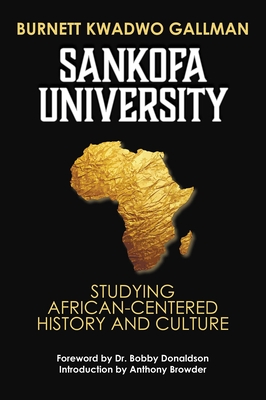Book Review: Sankofa University: Studying African-Centered History and Culture
by Burnett Kwadwo Gallman
(Jan 15, 2021)
Nonfiction, Paperback, 325 pages
More Info ▶
Book Reviewed by Robert Fleming
Dr. Burnett Kwadwo Gallman’s Sankofa University: Studying African-Centered History And Culture, is a stunning tribute to the achievements of our ancestors in the world’s culture and civilization. One of his fellow scholars and historians described it as “part memoir, part bibliography, part almanac, and essay collection.” The author, with an obsession to research and teach, says the genes and DNA of his ancestors won out in his life, citing the work of such trailblazers as John Hendrik Clarke, Asa G. Hilliard, Frances Cress Welsing, Chancellor Williams, and Cheikh Anta Diop.
In his home where academic excellence was stressed, Gallman’s grandparents and parents realize the value of education. His grandfather, Dr. Newton Alexander Doyle, the son of poor sharecroppers, worked his way through medical school. His father, Burnette W. Gallman was academically brilliant but died of Parkinson’s Disease when the author was only 14 years old. His family believed in the quote by Marcus Garvey about the significance of intelligent thinking.
“Never forget that intelligence rules the world and ignorance carries the burden,” Garvey writes. “Therefore, remove yourself as far as possible from ignorance and seek as far as possible to be intelligent.”
Gallman begins by defining culture as “the behavior and beliefs (both conscious and unconscious) of a particular group. However, he adds our culture, of our people kidnapped from Africa and enslaved, was systemically distorted and destroyed. Noting that we are in a culture war, he writes that we must “relearn our identity” and apply that knowledge in a positive manner to truly reflect who we are and not what others say we are.
This culture war takes casualties. Gallman remarks that even if a black adopts white, Asian, or Arab culture, he can never be any of those things. He further states that delusion will only let the person be used or manipulated. Everyone knows a person who says he or she is an expert on blacks and our culture, but often as Gallman says, those people are usually wrong or harbor negative ideas about us and our legacy.
On hip-hop culture, Gallman says it is “a youthful reflection of reality,” but was hijacked by thinking based on disrespect and materialism. His quote by the famed writer Frantz Fanon seems appropriate: “The oppressed will always believe the worst about themselves.” The author emphasizes that our tainted view of our men and women and our culture will influence future generations.
His term of Ausa moves beyond the static definition of our history, breaking through the usual confines of slavery to the glory days of the Motherland. Also, it covers the enslavement, colonization, and degradation of our race. He issues a stern warning with “trees that have grown from seeds planted during this time are still bearing fruit, even in today’s world.”
Another interesting segment, “Black History Factsheet,” is a quirky quiz of factoid tidbits worthy of the TV show, Jeopardy, minus host Alex Trebek. It’s not even a multiple-choice one. The professor-author touts the worth of study groups for our community, whereas Dr. Clarke says, knowledge is essential for “a consciously historic people cannot be truly enslaved.” He suggests the essential topics for any study group are research and discussion of the history and culture of ancient Africa and Egypt, where civilization began.
Included is a study guide of books from established black scholars and historians, worthy of your attention. Names of esteemed scholars and thinkers are listed such as Dr. Josef Ben-Jochannon, Dr. Wade Nobles, Dr. Leonard Jeffries, Dr. Lerone Bennett, Dr. Na’am Akbar, W.E.B. Du Bois, and Samuel Yette. Another bonus is an extensive selection of important books critical for the study of our history and culture. Also, I had fond memories when the author mentioned some of the crucial publications from the golden age of protest and revolution like Black Book Bulletin, Black World/ Negro Digest, Freedomways, Black Scholar, and Journal of Black Studies.
What I found is Gallman’s definition of Maafa, a Swahili term for the African Holocaust, where millions were killed, tortured, captured through slavery, and subjected to colonialism and apartheid. The author traces the origins of Maafa back to 1492 when Christopher Columbus and his crew colonialized people of color in the New World. There are two short informative pieces on Columbus and the racist practice of blackface. In another segment, he exposes the real political motives of Abraham Lincoln, the Great Emancipator, noting the high esteem history holds of him. “He has received credit,” Gallman writes, “for doing things he did not do and did not believe in.”
On reparations, Gallman explains the concept of repayment for suffering and tragedy with amends, retribution, and compensation. He writes of the human injustice committed, the documentation of the human rights crimes, the identification of victims, and the continuation of the suffering of those people. However, the author serves up many of the excuses of the oppressors for not granting reparations. Among them are: none of my ancestors own slaves; blacks should be lucky that they were taken from Africa; my ancestors arrived in America after slavery was over; Africans sold other Africans and are responsible for their oppression; what was wrong with being a slave in America, no aftereffects on blacks after slavery; blacks love to play the victim; other immigrants have done well but what can’t blacks do as well, and why blacks accept an apology and move
This book brings reason and practical wisdom to topics usually ruled by emotion, ignorance, and fear. Every article fosters illumination and enlightenment. Much of Dr. Gallman’s analysis is convincing and he can be very articulate, precise, and persuasive with facts to back him up. He excels at the big picture and its cultural and historical after-shocks. This book is an intellectual force to be reckoned with.

